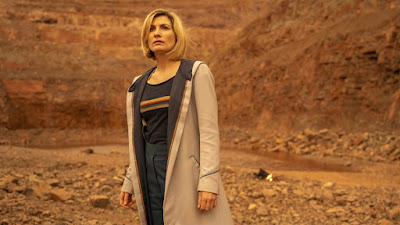It was never her fault.
She was "brilliant" (her first spoken word).
She is Jodie Whittaker, who embodied The Doctor, the titular character of "Doctor Who" from mid-2017, when she was first announced as the 13th Doctor, until tonight.
Her final episode is airing as I'm writing.
The character had been a collection of white men from its first airing in Nov 1963 and the announcement of Whittaker was met with a lot of misgiving.
The misgiving needed to be for showrunner Chris Chibnall, who seemed to take so much of what made the "modern" Doctor Who (beginning in 2005) great and blow it up. Change, of course, can be good, but it can also be dangerous when dealing with a beloved show with a rabid fan base.
Whittaker and her companions were very much not the problems.
The writing was.
But Sean, my expert on all Whovian matters, was not thrilled about Whittaker at first. It had nothing to do with Jodie but everything to do with the way the character had been constructed. I actually wrote about it on social media -- yes, I learned my lesson -- and it led to a lengthy back and forth with friends and with a couple of women taking my side.
I think Sean was also concerned about embracing a new Doctor, following the previous incarnations, all of whom he liked a lot.
Still, in the end, TV show rules are allowed to evolve. It's a TV show after all.
Sean and I watched the first episode with the 13th Doctor, "The Woman Who Fell to Earth," and were impressed.
Soon after, the quality dropped, and Sean lost interest. I continued to watch but, admittedly, with no Sean, I also failed to stay up on the episodes.
But regeneration is a big deal so I'm back in tonight.
If you've never watched one, the regeneration -- in which the show can carry on with a new actor in the role -- can be a deeply emotional thing. Virtually all of the regenerations since 2005 have been a remarkable ride. Personally, I found the departures of David Tennant, Matt Smith, and Peter Capaldi to be particularly gut-wrenching. I'm fairly certain I've quoted each of them at one time or another here.
Now, for the record, I've already seen the regeneration since the episode aired in the U.K. hours ago. The BBC posted it on their social media and, despite the "SPOILER ALERT" ("spoilers" is an important phrase to Whovians) I still watched it.
Yeah, I was pretty blown away by what I saw. It was a fine way for Jodie to depart. Social media told me enough to know what happened after. I got Sean to watch that and he just kept saying, "What?" over and over again.
What, indeed.
I'm watching the full episode now to understand how we got to the regeneration.
More than anything, I want to thank Jodie Whittaker -- no, I have no thought that she'll actually read this -- for carrying on the character in such a wonderful way. She brought the humor, charm, and edge to The Doctor that fans have loved for almost 60 years.
And, if Sean were writing, he'd say the same. We both came to love Whittaker and I'll admit I'd be interested in anything she acts in. While I really appreciate her work as "The Doctor," I thought she was incredible in "Broadchurch," a crime program that included many pieces of the "Whoniverse." Whittaker and David Tennant were just two parts, along with Chibnall, who created the program.
Of course, this is a fun process, given the Yankees are trying to stay alive (2-0, bottom of the first as I write in Game 4) and the Steelers are playing the Dolphins (that's not going so well). So multiple devices are bringing me this buffet of riches.
While this era of "Doctor Who" will be seen through a difficult prism, I'm still hopeful that Sean will return to it as it became another thing that bonded father and son.
While nothing lasts forever, there are always older episodes to keep us talking.
As for what's next, well, all I can say is "allons-y" which is French for "Let's Go."
A Whovian knows what that means.

No comments:
Post a Comment